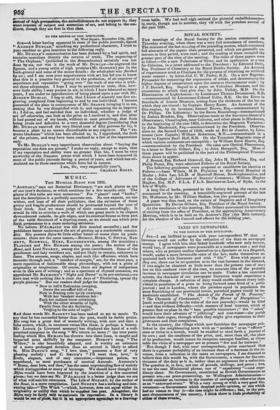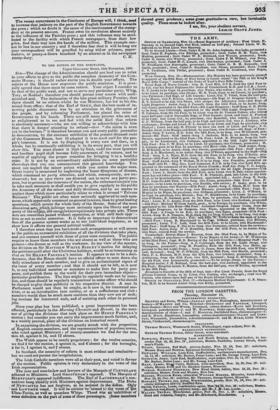TAXES ON NEWSPAPERS. TO TILE EDITOR OF THE SPECTATOR.
SIR—I am inclined to agree with your correspondent W. that a revenue would not suffer by the reduction of the duty on newspaper
stamps. I agree with him that !many hundreds who- now only borrow, would buy, if newspapers were procurable at a moderate rate ; and that others, who at present confine themselves to a Spectator or to a Dispatch,
• would under a more favourable state of the law, make themselves ac- quainted both with literature and with " life." Even with papers as they are, there can be no question as to the vast increase in the demand, if two might be obtained at little more than the present cost of one; but on this confined view of the case, no accurate idea of the probable increase in newspaper circulation can be made. Under a less restricted system, the character of our newspaper literature would experience a ' complete change. A reduction of duty would enable almost every indi. -vidual in possession of a press to bring forward some kind of a public "journal ; and in London, where the parishes equal in population the most flourishing of our provincial towns, parochial papers would be im- mediately established. " The Annals of the Parish of St. Pancras," 1` The Chronicle of Clerkenwell," " The Mirror of Marylebone"— (such would probably be the titles of the new journals)—would be filled -rand that without difficulty—with matters of local interest, which at present find no place in the best possible instructors ;" the " select" would have their advocate of " jollifying" and rose-water—the parish patriots their organ, through which they might give expression to their grievances and their complaints. In the country, the village which now furnishes the newspaper pub- lished in the neighbouring town with an " accident " or an " offence " • once or twice in a month, would be enabled to send forth a journal of its own ; and the smallness of the price, and, more than all, the place of its production, would insure its reception amongst families, at whose table the visits of a newspaper are at present "few and far between." But though I feel, with your correspondent, quite convinced that there is a greater probability of an increase than of a decrease in-the re- venue, from a reduction in the taxes on newspapers, I am disposed to believe that this would be, with the Government, a reason for the con- tinuance of the duty as it is, rather than an argument for a reduction. The question is, in fact, not one of pounds, shillings, and pence; but, to use the cant Ministerial phrase, one of "expediency "—and expe- diency alone. No Government, constituted as British Governments at present are--no press-prosecuting, no Wellington Administration— would consider an increase in the number of newspapers otherwise than as an "untoward event." With a very strong or with a very good Go. vernraent—a Government which despised public opinion, or one which had no reason to fear it—the case might be different; but, in the pre- sent circumstances of the country, I think there is little probability cit either of tbese.events.: The recent occurrences in the Continent of Europe will, I think, tend to increase that jealousy on the part of the English Government towards the press ; which no doubt is the cause of the continuance of the stamp- duty at its present amount. France owes its revolution almost entirely to the influence of the Parisian press ; and this influence may be attri- buted to• the facility with which French newspapers, from their low price, find their way into the hands of the million. This example can- not be lost in our country ; and I therefore fear that it will belong ere your correspondent will be gratified by seing 'either printers, paper- makers, or penny-a-liners benefited by an alteration in the newspaper



























 Previous page
Previous page